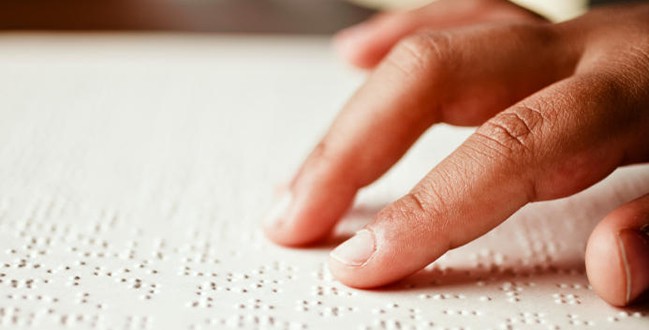
Motor Development:
"Very young children who are blind have no natural motivation to lift their heads or roll, and they are less able to orient themselves to the external environment through such skills as reaching, crawling and walking."(Winzer pg 371) In older children, visual impairment has an effect on physical activity. Some delays in motor development include poor balance and inefficient gait.
Cognitive Development:
It has been wondered by researchers whether or not children who are blind will do more poorly on tasks involving abstract thinking. There is a debate whether or not children who have severe visual impairments, fall a great deal behind their peers who have sight in the development of Piagetian tasks.
"How children learn, and which lags in learning are attributable to visual impairment are, however, subjects of intense debate." (Winzer 371)
Perceptual Development:
 In order to use other senses, it takes alot of concentration to compensate for their lack of sight. "There is no magical sensory compensation of the remaining senses; blind persons must learn to pay more attention to auditory and tactual clues that sighted people can afford to ignore." (Winzer pg 373) There are two different types of touch that a person with visual impairment uses. One is called synthetic touch, which is for small objects in which you can enclose in your hands. The other one is called analytic touch, which means that they explore the different parts of an object and than mentally reconstruct the parts.
In order to use other senses, it takes alot of concentration to compensate for their lack of sight. "There is no magical sensory compensation of the remaining senses; blind persons must learn to pay more attention to auditory and tactual clues that sighted people can afford to ignore." (Winzer pg 373) There are two different types of touch that a person with visual impairment uses. One is called synthetic touch, which is for small objects in which you can enclose in your hands. The other one is called analytic touch, which means that they explore the different parts of an object and than mentally reconstruct the parts. Communication:
"Even before they develop speech, infants with visual impairments use vocalizations to achieve and maintain social contact." (Winzer pg 372) Listening to someone talk, is how a person with visual impairment gets to know someone. They need to use their other senses in order to get to know a person.
Social and Emotional Development:
Children who are visually impaired, miss out on many important cues such as facial expression, gestures and body language. Communication with sighted people, may be harmed by lack of eye contact. "The failure to look at people may be interpreted as disinterest rather than as a manifestation of the disability itself."(Winzer pg 373) Ontario researchers have found that people with visual impairments are lonely and isolated and that they have fewer friends due to fewer opportunities to socialize and to development their interpersonal skills.
Take a minute and watch the video :)
No comments:
Post a Comment